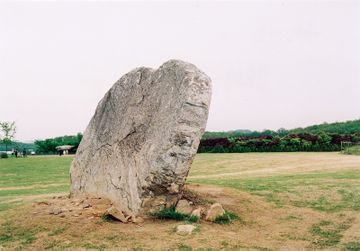"부근리고인돌군"의 두 판 사이의 차이
| (사용자 2명의 중간 판 10개는 보이지 않습니다) | |||
| 22번째 줄: | 22번째 줄: | ||
=='''해설문'''== | =='''해설문'''== | ||
===국문=== | ===국문=== | ||
| − | 강화 지역에는 청동기 시대의 대표적인 무덤인 고인돌이 여기저기 흩어져 있으며, 특히 이들 중 | + | 강화 지역에는 청동기 시대의 대표적인 무덤인 고인돌이 여기저기 흩어져 있으며, 특히 이들 중 10~20여 기에 달하는 무리를 이루고 있는 고인돌군이 5곳이 있다. 이 중 하나인 부근리 고인돌군은 해발 50m 내외의 낮은 구릉과 평지에 위치하며, 모두 16기의 고인돌이 분포하고 있다. 평지에는 사적 제137호 강화 부근리 지석묘와 탁자식 고인돌의 굄돌로 추정되는 석재 하나가 세워져 있다. 약 300m 떨어진 솔밭 주변으로 덮개돌 밑에 고임돌이 없는 개석식 고인돌들이 있으며, 동쪽 낮은 구릉에는 탁자식 고인돌과 개석식 고인돌들이 분포하고 있다. 2000년 12월 2일 고창, 화순의 고인돌 유적과 함께 유네스코 세계유산에 등재되었다. |
===영문=== | ===영문=== | ||
| − | ' | + | A dolmen is a type of megalithic tomb constructed during the Bronze Age (1500-300 BC). Dolmens are found all over the world, but 40,000 to 45,000 of them - nearly 40% of the world's total - are located on the Korean peninsula. Ganghwado Island is home to a total of 160 dolmens. Among these, 70 were inscribed on the UNESCO World Heritage List in 2000, together with others in the Hwasun and Gochang areas in Jeolla-do Province. |
| − | + | Dolmens can be found alone or in groups. There are five dolmen groups on Ganghwado, among which is this group of 16 dolmens in Bugeun-ri. The largest one, standing alone in the field next to the paved road, is designated as Historic Site No. 137. Other dolmens distributed around the pine trees are either table type or unsupported capstone type. Table type dolmens are comprised of upright, stone slabs covered by a wide, flat capstone to create an above-ground burial chamber. Unsupported capstone type dolmens are comprised of a capstone on top of an underground stone burial chamber. | |
| − | + | ===영문 해설 내용=== | |
| + | 고인돌은 청동기 시대의 대표적인 거석무덤이다. 고인돌은 전 세계에서 발견되고 있으며, 세계 고인돌의 40%에 달하는 4만~4만 5천기의 고인돌이 한반도에서 발견되었다. 강화도에는 총 160기의 고인돌이 있으며, 이중 70기가 전라도 화순과 고창의 고인돌들과 함께 2000년 유네스코 세계유산으로 등재되었다. | ||
| + | 고인돌은 단독 또는 여러 기가 군집으로 발견된다. 강화도에는 고인돌군이 5곳이 있으며, 이 고인돌군에는 모두 16기의 고인돌이 분포하고 있다. 이중 포장도로 옆 평지에 홀로 서있는 가장 큰 고인돌은 사적 제137호로 지정되었다. 솔밭 주변에 분포하고 있는 다른 고인돌들은 탁자식이거나 개석식이다. 탁자식 고인돌은 받침돌을 세워 돌방을 만들고 그 위에 넓고 평평한 덮개돌을 올려서 만들어진다. 개석식 고인돌은 지하의 석실 위에 덮개돌이 바로 놓이게 된다. | ||
| + | [[분류:문화유산해설문]] | ||
[[분류:인천광역시 문화유산]] | [[분류:인천광역시 문화유산]] | ||
| − | [[분류:시도기념물 ]] | + | [[분류:강화군 문화유산]] |
| + | [[분류:시도기념물]] | ||
[[분류:지석묘]] | [[분류:지석묘]] | ||
| + | [[분류:2018 영문집필]] | ||
2023년 4월 10일 (월) 12:12 기준 최신판
| 부근리고인돌군 Dolmens in Bugeun-ri, Ganghwa |
|
| 대표명칭 | 부근리고인돌군 |
|---|---|
| 영문명칭 | Dolmens in Bugeun-ri, Ganghwa |
| 한자 | 富近里고인돌群 |
| 주소 | 인천광역시 강화군 하점면 부근리 317 |
| 지정번호 | 인천광역시 기념물 제44호 |
| 지정일 | 1999.04.26 |
| 분류 | 유적건조물/무덤/무덤/지석묘 |
| 소유자 | 인천광역시 강화군청 |
| 수량/면적 | 16기 / 216,036㎡ |
|
|
|
해설문
국문
강화 지역에는 청동기 시대의 대표적인 무덤인 고인돌이 여기저기 흩어져 있으며, 특히 이들 중 10~20여 기에 달하는 무리를 이루고 있는 고인돌군이 5곳이 있다. 이 중 하나인 부근리 고인돌군은 해발 50m 내외의 낮은 구릉과 평지에 위치하며, 모두 16기의 고인돌이 분포하고 있다. 평지에는 사적 제137호 강화 부근리 지석묘와 탁자식 고인돌의 굄돌로 추정되는 석재 하나가 세워져 있다. 약 300m 떨어진 솔밭 주변으로 덮개돌 밑에 고임돌이 없는 개석식 고인돌들이 있으며, 동쪽 낮은 구릉에는 탁자식 고인돌과 개석식 고인돌들이 분포하고 있다. 2000년 12월 2일 고창, 화순의 고인돌 유적과 함께 유네스코 세계유산에 등재되었다.
영문
A dolmen is a type of megalithic tomb constructed during the Bronze Age (1500-300 BC). Dolmens are found all over the world, but 40,000 to 45,000 of them - nearly 40% of the world's total - are located on the Korean peninsula. Ganghwado Island is home to a total of 160 dolmens. Among these, 70 were inscribed on the UNESCO World Heritage List in 2000, together with others in the Hwasun and Gochang areas in Jeolla-do Province.
Dolmens can be found alone or in groups. There are five dolmen groups on Ganghwado, among which is this group of 16 dolmens in Bugeun-ri. The largest one, standing alone in the field next to the paved road, is designated as Historic Site No. 137. Other dolmens distributed around the pine trees are either table type or unsupported capstone type. Table type dolmens are comprised of upright, stone slabs covered by a wide, flat capstone to create an above-ground burial chamber. Unsupported capstone type dolmens are comprised of a capstone on top of an underground stone burial chamber.
영문 해설 내용
고인돌은 청동기 시대의 대표적인 거석무덤이다. 고인돌은 전 세계에서 발견되고 있으며, 세계 고인돌의 40%에 달하는 4만~4만 5천기의 고인돌이 한반도에서 발견되었다. 강화도에는 총 160기의 고인돌이 있으며, 이중 70기가 전라도 화순과 고창의 고인돌들과 함께 2000년 유네스코 세계유산으로 등재되었다.
고인돌은 단독 또는 여러 기가 군집으로 발견된다. 강화도에는 고인돌군이 5곳이 있으며, 이 고인돌군에는 모두 16기의 고인돌이 분포하고 있다. 이중 포장도로 옆 평지에 홀로 서있는 가장 큰 고인돌은 사적 제137호로 지정되었다. 솔밭 주변에 분포하고 있는 다른 고인돌들은 탁자식이거나 개석식이다. 탁자식 고인돌은 받침돌을 세워 돌방을 만들고 그 위에 넓고 평평한 덮개돌을 올려서 만들어진다. 개석식 고인돌은 지하의 석실 위에 덮개돌이 바로 놓이게 된다.
